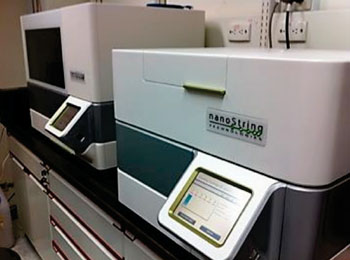Blood Test Developed to Catch Pancreatic Cancer Early
By LabMedica International staff writers
Posted on 09 Sep 2015
Pancreatic cancer is the fourth most common cause of cancer-related death in the USA and has a five-year survival rate of only 6%, which is the lowest rate of all types of cancer and this low survival rate is partially attributed to the difficulty in detecting pancreatic cancer at an early stage. Posted on 09 Sep 2015
Pancreatic cancer survival rates can be improved by identifying markers in the blood that can pinpoint patients with premalignant pancreatic lesions called intraductal papillary mucinous neoplasms (IPMNs), which can be characterized as either low- or high-risk for the development of pancreatic cancer.

Image: The nCounter Analysis System (Photo courtesy of NanoString Technologies).
Scientists at the Moffitt Cancer Center (Tampa, FL, USA) and their colleagues developed a fast, cost-effective blood test by studying micro ribonucleic acids (miRNAs), a class of small molecules that regulate key genes involved in the development and progression of cancer. The test can accurately differentiate low-risk IPMNs that can be monitored from high-risk IPMNs that need to be surgically removed. The team measured the abundance of miRNAs in archived preoperative plasma from individuals with pathologically confirmed IPMNs and healthy controls and discovers plasma miRNAs that distinguish between IPMN patients and controls and between “malignant” and “benign” IPMNs.
The scientists used novel nCounter technology (Nanostring Technology, Seattle, WA, USA) to evaluate 800 miRNAs, and showed that a 30-miRNA signature distinguished 42 IPMN cases from 24 controls. The nCounter Analysis System utilizes a novel digital color-coded barcode technology that is based on direct multiplexed measurement of gene expression and offers high levels of precision and sensitivity at less than one copy per cell. The technology uses molecular "barcodes" and single molecule imaging to detect and count hundreds of unique transcripts in a single reaction.
The signature contained novel miRNAs and miRNAs previously implicated in pancreatic carcinogenesis that had two- to four-fold higher expression in cases than controls. They also generated a five-miRNA signature that discriminated between 21malignant, high-grade dysplasia and invasive carcinoma, and 21 benign low- and moderate-grade dysplasia IPMNs, and showed that paired plasma and tissue samples from patients with IPMNs can have distinct miRNA expression profiles.
Jennifer Permuth-Wey, PhD, the first author of the study, said, “IPMNs are established precursor lesions to pancreatic cancer that account for approximately half of all asymptomatic pancreatic cysts incidentally detected by computerized tomography (CT) scans or magnetic resonance imaging (MRI) in the USA each year. The hope is that in the not-so-distant future a miRNA-based blood test can be used in conjunction with imaging features and other factors to aid the medical team in accurately predicting disease severity of IPMNs and other pancreatic cysts at the time of diagnosis or follow-up so that more informed personalized medical management decisions can be made.” The study was published on August 27, 2015, in the journal Cancer Prevention Research.
Related Links:
Moffitt Cancer Center
Nanostring Technology














